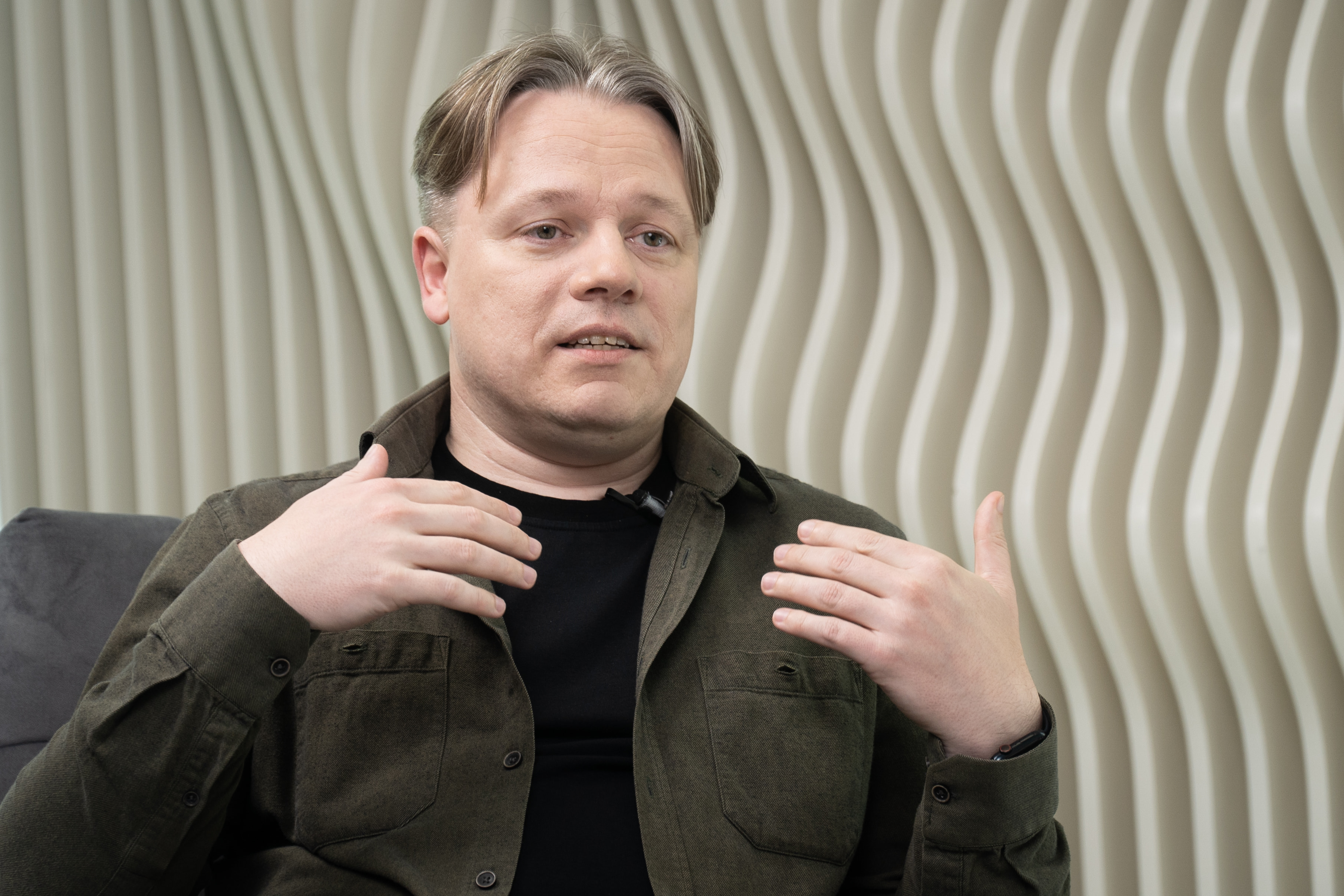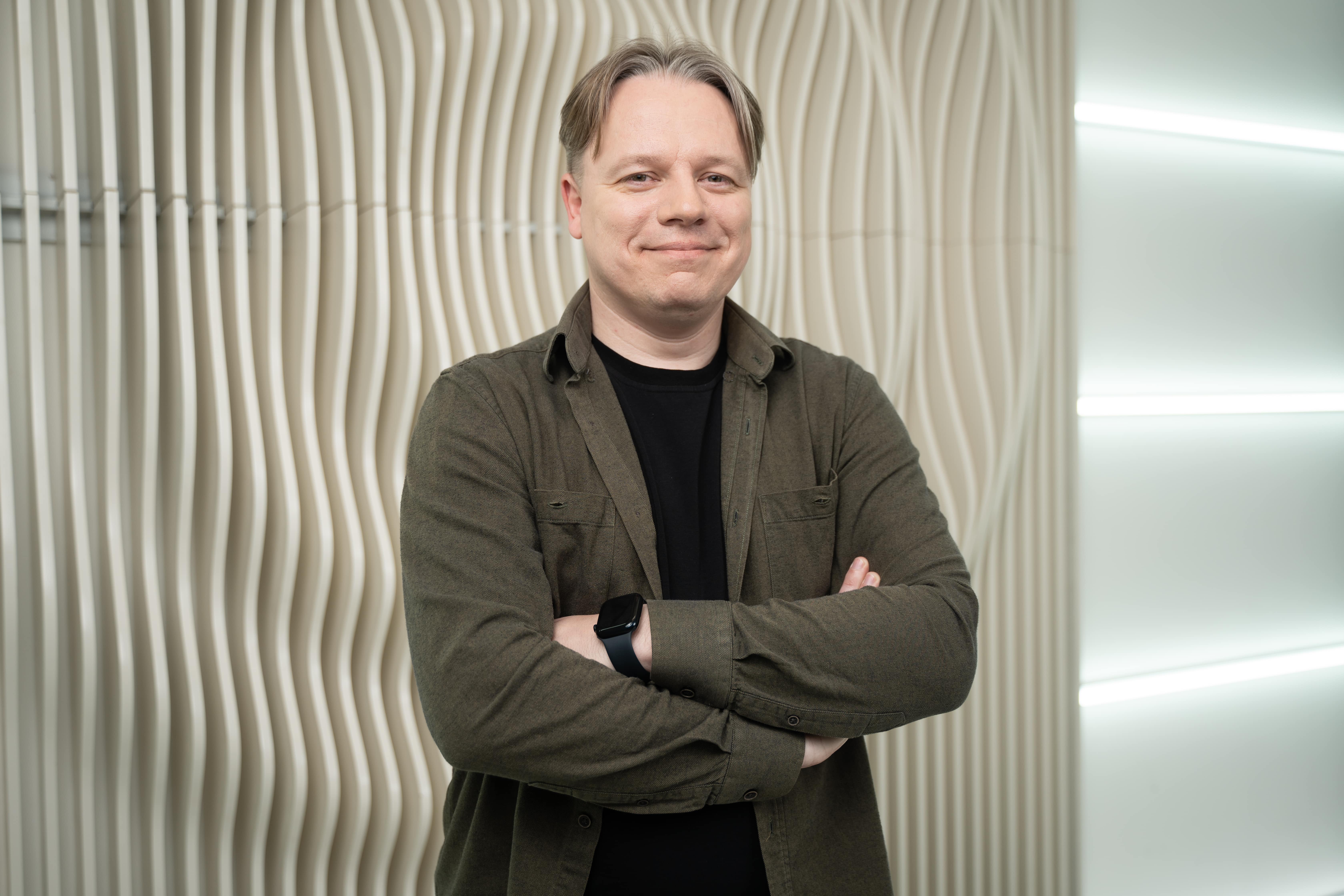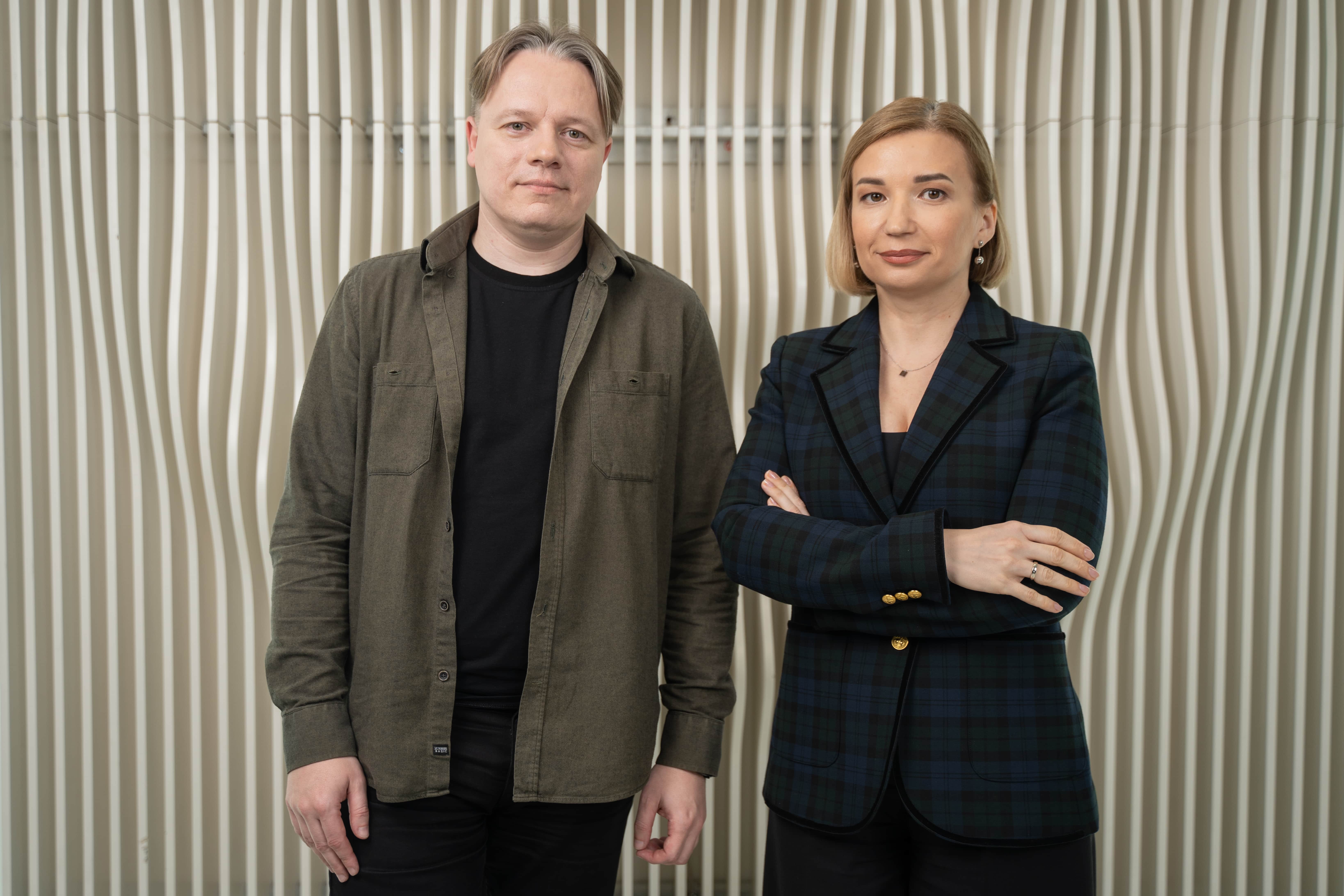"The myth of peaceful coexistence is an entirely colonial perspective, and access to archives is crucial in dismantling it," explains Andriy Kohut, Director of the Sectoral Archive of the Security Service of Ukraine (SBU). According to Kohut, Western academia has been influenced by the long-standing perception that in this part of the world, there was only Russia and its periphery, a view that has been constructed over centuries. "This is starting to change. But we need to institutionalize these ongoing discussions about decolonization and ensure that Ukraine's voice is represented at every level in any conversations about Ukraine," Kohut states. The discussion took place in an interview with Olha Aivazovska as part of the Civil Network OPORA's project, "The Power of Choice."
*The video has automatic English subtitles available on YouTube if you click the proper button in your video player.
On the eve of the full-scale invasion, our partners actively warned of the approaching danger and mentioned that blacklists had been compiled [by Russia], targeting [Ukrainian] public figures, journalists, and political leaders for elimination. As the Russian army occupied [Ukrainian] territory, the Rosgvardiya or FSB would eventually follow to carry out alleged crimes against humanity. Are there any historical parallels with the KGB's repression of public opinion leaders?
In January 2022, I was at Stanford on a Fulbright scholarship, and the news that the FSB had drawn up lists of individuals for immediate repression was discussed on campus. This was a strange feeling for me because just the previous year, we had published a book with our Polish partners on this very topic—albeit from 1939. Prior to World War II, when the Soviet Union was allied with Nazi Germany, Stalin, like Hitler, was preparing to invade Poland. The Soviets prepared far more thoroughly than the Nazis did, having had years of experience and practice in conducting repressions. Consequently, before September 17, when the Soviet Union entered the war and occupied part of then-Poland, a massive operation had already been planned. Our book, "Operation Proscription," describes how lists of those to be repressed were compiled. At that time, the primary targets were individuals who played significant roles in local social and political life: government officials, parliament members, journalists, entrepreneurs — the people we today would call civil society activists. In 1939, a great deal of work went into compiling these lists, using archives, libraries, and intelligence sources. In 2022, it's much simpler, as everything is online.
This was a good illustration of how today Russia is using methods from the past in its war against Ukraine. Unfortunately, many of the events we currently experience give a sense of déjà vu. Russia employs the same methods but utilizes modern tools, making them more refined.
Are there any archival records related to methods for recruiting local people into intelligence networks, and do they resemble modern methods?
We are an archive and work with the past. It's difficult for me to compare with the present, but we can discuss certain events that Russia has undoubtedly used to infiltrate other countries with its agents. For example, when hundreds of thousands of people began fleeing Russia to avoid mobilization, the FSB and other agencies likely used this opportunity to send agents to the West. The purpose, among other things, was to make bizarre statements on behalf of the so-called Russian opposition.
If we look at historical cases of mass forced relocations—such as the so-called "voluntary" population exchange between Poland and the Soviet Union, where Ukrainians were deported from Poland to Soviet Ukraine and Poles from Soviet Ukraine to Poland — the NKVD and MGB used this process to insert agents among the Poles relocating to Poland.
KGB archives give us insight into the mindset of a typical FSB officer. I don’t believe they come up with anything new; instead, they go to the archives, review old instructions and orders, study the best practices of their predecessors, and adapt them to today’s conditions.

We can observe how Russia's "victory frenzy" has become an element of a new system of coordinates in Russia, particularly as the foundation for its claims of "denazifying" Ukraine to justify a full-scale invasion. How do you see this myth of Ukrainian Nazis developing?
It’s important to start with how this myth was created in the first place. One of the key stages was the classification of everything related to the Great Patriotic War. On one hand, this meant placing maximal restriction on access to archival documents that could reveal the truth, and on the other, the construction of a myth designed to create an extremely simple narrative: there are the fascists — everyone we fight against — and then there’s us, the fighters against fascism. Once this construct was formed, you could substitute anyone for the role of fascists: Georgians, Ukrainians, and later perhaps Kazakhs, Moldovans, Poles — it didn’t matter. The framework already existed, and all that was needed was to change the target. And unfortunately, this works.
It’s also crucial to remember the active propaganda, disinformation, and counter-propaganda campaigns directed outward: at the U.S., Canada, and the Western world. The KGB worked on this extremely actively throughout its existence. These campaigns created the impression that Ukrainians equaled fascists. Russia still uses the history of World War II, especially focusing on Ukrainian participation in various military structures that fought on the side of the Third Reich. This is something they've always done.
A few years ago in Canada, the local Russian consulate spread a message that the SS "Galicia" Division was fascist, linked to the Ukrainian Insurgent Army (UPA), and therefore the entire Ukrainian diaspora was fascist. At that moment, I was working with documents from the final years of the KGB’s existence, and they described a nearly identical information operation, in which an article about the SS "Galicia" Division was pushed through a journalist in the Toronto Star in Canada, carrying the same messages. You read this and it’s hard to tell if it’s from 1987, 2017, or 2022.
Unfortunately, this approach often works. The issue is not just that Russia has vast resources to pursue this, supported by the image of "great Russian culture" built over centuries. Another problem lies in how Western scholars view our part of the world. Before the full-scale invasion, for them, there was only Russia and something on the periphery. This has a long history, and the inertia of these views is powerful. It is very difficult to fight against the myths that have been constructed. It’s slightly easier now because Russia’s crimes, which have become obvious to all, provide an opportunity for at least some Western researchers, intellectuals, experts, and politicians to rethink the information they receive. But there’s still a lot of work to do.
Is there a difference in the discourse of Western historians before the full-scale invasion of Ukraine compared to today? What, beyond significant financial resources, could influence the discourse?
I would not speak so much about money as about resources, which can be very diverse. Specifically, the possibility of open access to KGB archives is one of the critical resources that could ensure that Western academia cannot avoid rethinking and taking the necessary critical approach to everything.
Before February 2022, the things Ukrainian historians said were often perceived [in the west] as if Ukrainians disliked Russians for nationalist reasons without an objective basis. Now, it’s a bit easier to talk about this. At the very least, when the topic of decolonization in Ukraine comes up, someone from Ukraine should be present to represent our perspective on the issue. There’s an interest in hearing this perspective now. They will listen, though it’s not guaranteed they’ll truly hear. But even this is a significant shift.
People are beginning to recognize a distinct Ukrainian history that stands apart from Russian, Polish, or other histories, which is also a huge shift. If we look back at Ukrainians who studied and worked in universities in the U.S., Canada, and Britain during the 1950s–1970s, they were in a kind of an intellectual ghetto. They were often seen as Soviet refugees, although a bit on the nationalist side because they spoke their own language and called the Soviet Union an empire. It was not taken entirely seriously, regarded as somewhat aboriginal. Now, however, there’s genuine interest. Many young researchers are starting to study Ukraine, learning Ukrainian, and asking what it is about Ukraine that leads it to resist Russia.
In my experience at Stanford, just before the full-scale invasion, there was discussion about whether Ukraine would fight against Russia. I found this strange. If we look at the Soviet period, Ukraine had always fought — sometimes more, sometimes less, sometimes with weapons, sometimes without, but the struggle had always been there. Especially since 2014, the fight with Russia has been continuous, so what reason was there to assume it would be different this time? Back then, it wasn’t obvious to them; they were still under the sway of their own metanarratives.
This is changing now. But it is worth for us to institutionalize what’s happening—these conversations about decolonization and the fact that any discussion about Ukraine must include a Ukrainian voice at all levels: government, civil society, academic, cultural, and so on.

Lack of historical knowledge leads to a misunderstanding in the West about the origins of this war, as they believe we lived as a family without any problems for centuries. Currently, several parliaments around the world have already legitimized the position that the Holodomor of 1932–1933 was not just a coincidence or a tragedy. Do archives contain enough information to reveal the sources of this genocidal war?
The myth of friendly coexistence is an entirely colonial perspective. Access to archives is key here because rethinking the past is impossible without revisiting archival documents. All those narratives—books, scholarly articles, documentaries—were one way or another created through the lens of a space dominated by Russia, where everyone else is viewed as slightly different and strange Russians.
Our current problem is that researchers cannot come to Ukraine due to military actions. Many universities do not allow researchers to visit and work directly with Ukrainian archives. The solution is digitization. Ukraine is currently digitizing many state archives. Digitization, along with the preparation of various English-language guides, manuals, and descriptions, is essential to help understand and work with these resources. This is something we are interested in because without this, rethinking cannot occur.
A good example is the Holodomor and its recognition as genocide by various countries' parliaments. Researchers on the Holodomor have done immense work: hundreds of articles and books, including those in English, have been published, as well as various documents. There are now two major research centers in the West focusing on the Holodomor—one at Harvard University in the United States and another at the University of Alberta in Edmonton, Canada—along with several private foundations. If a young person starts working on the topic of the Holodomor there, they will have opportunities to publish articles, find publishing houses and foundations to support the publication of books on this topic, and there will be positions available for future employment, etc. Without a similar process addressing the rethinking of Russia's imperial past, we won't be able to consolidate the current trend.
How rich are Ukraine's archives in these materials?
The Security Service of Ukraine's archive is unique—it is the largest open collection of KGB documents. For example, in the Baltic countries, Russia removed documents just before the collapse of the Soviet Union because Moscow did not expect those countries to be part of the common Soviet family. There was no such assumption about Ukraine; at that time, Moscow was convinced that Ukraine would follow whatever the Kremlin said. As a result, we have preserved a much larger collection of documents than the Baltic countries.
In addition to the files of those who were repressed, we have orders, instructions, directives, documents from various departments (KGB, MGB, NKVD, GPU, OGPU, Cheka), statistics, textbooks, and journals. This means we have virtually the entire spectrum of KGB documentation and that of its predecessors, allowing us to fully recreate how these punitive organs and secret services of the communist regime operated. This gives us the opportunity to say, "Come to us, work with us; this will change your perspective on what the Soviet Union was, what the Russian Empire was, and what Russia is today."
Do ordinary citizens have access to this information, or just historians, researchers, and journalists?
Today, unfortunately, reading rooms are closed due to constant air raid alerts and danger. However, when you reach out to us, we will make and send you a digital copy. Of course, it’s not the same feeling as flipping through the pages of a case file, but it is still a way to access information. More than half of those who contact us are relatives seeking information about their repressed family members.

In modern Russian history, there have been murders involving poisoning: Alexander Litvinenko, Sergei Skripal, Alexei Navalny. There is a case in the archives regarding the poisoning murder of Stepan Bandera. How widespread is the practice of assassinations abroad in the Soviet Union's history?
The circumstances of Stepan Bandera's murder were revealed because of the agent's own confession: Stashinsky came and voluntarily turned himself in. The security service tried to frame the situation as if it were the Melnykites [an opposing political faction – ed.] who killed Bandera or some other Ukrainians, suggesting that Ukrainians could not settle their differences and killed each other. Only when Stashinsky revealed everything did the trial take place, and that’s when everyone found out. For Western intelligence agencies, this seemed fundamentally impossible. It is hard for a person in the West to imagine that the murder of an opponent could become an obsession.
Currently, news about the assassination of Russian opposition figures appears regularly. However, it is extremely difficult to prove that the FSB was responsible, even when it seems 100% likely: the modus operandi, motives, everything aligns. There simply isn’t anyone who confesses, and there are no cases.
It’s also worth noting that Russia never forgives anyone for anything. So, if Ukraine does not win, those who try to emigrate somewhere will definitely not be forgiven by Russia. A few years ago, we published a book titled “Woe to the Vanquished: The Repressed Ministers of the Ukrainian Revolution,” where we gathered stories of ministers from the Ukrainian People's Republic and the Skoropadskyi state and highlighted the waves of repression against them. The last wave of repression against these individuals occurred after World War II when the Soviet Union established control over Central and Eastern Europe. People were abducted from Austria or West Germany, taken to the Soviet Union, interrogated, beaten up into confessions, and then criminal cases were fabricated against them. Many of these individuals never held citizenship of the Soviet Union. They had once lived in the territory of the Russian Empire but had no legal ties to the Soviet Union whatsoever.
The fact that people spoke out, wrote articles, and called for resistance against the Soviet Union was enough to convict them under the Criminal Code of the Russian Federation. Putin's statement that Russia has no borders literally means that there are no boundaries at all in anything. It is important that not only Ukrainians understand this.
The Soviet Union punished political and state figures, as well as resistance representatives, through their children. Currently, one of the most pressing and high-profile cases in the world is the International Criminal Court’s warrant for Putin and [his children’s “ombudsman”] Lvova-Belova due to the abduction and illegal adoption of Ukrainian children.
The deportation of children and attempts to change their identity is an instance where modern Russia has adopted methods that existed during the Soviet era. In the USSR, this was typically applied to the children of those who actively participated in the struggle against Moscow or the Communist Party. When we talk about Ukraine, we refer to the soldiers of the Ukrainian Insurgent Army and members of the Organization of Ukrainian Nationalists, but it also affected Poles and others. Their children were deliberately placed in Russian families so that they would grow up as ordinary Soviet citizens, completely unaware of their true origins. The children of Roman Shukhevych make one such example. However, at that time, these were isolated cases because Moscow viewed the identity issue somewhat differently — the main focus was on being a Soviet person. Today, Russia has made this a widespread practice and developed this method of operation.
Deportations, forced displacements, and attempts to replace identities are tools whose “refinement” can be traced from the Russian Romanov Empire through the Soviet Union to the present day. True, children are the most visible victims, and their situation is so horrible that it touches everyone, it attracts attention. However, there are also many cases related to filtration and deportation based on the same experience.
For instance, Siberia is a vast white spot in Russia where something is happening, but no one knows what. The Russian Empire used it to suppress the revolting Poles. The Soviet Union used it to fight against Ukrainians. Today, we again hear high-ranking officials from the Kremlin stating that all Ukrainians who do not want to recognize themselves as Russians should be sent to Siberia. The archives provide an opportunity to show that this has happened in the past, that this is not impossible.
When the world talks about protecting human rights and combating totalitarian regimes, it sounds very good but lacks concrete action behind it. In the case of Russia, this work has been done in reverse. If the entire Western world claims to be champions of democracy and human rights, then why has it made all this possible? We must discuss co-responsibility here. Economic cooperation with Russia, purchases, sales, and many other things have made this possible. Russia itself cannot create anything except methods of repression, torture, and murder. The world has enabled this.

After World War II, the Soviet Union, as a contemporary empire, was not punished. Why?
Firstly, it was an ally in the coalition of victors. Secondly, the Soviet Union was not considered an empire in principle, and this is still not entirely clear to everyone.
During my time at Stanford, I attended a course by Professor Amir Weiner, and in one seminar, he asked master’s and doctoral students whether they considered the Soviet Union an empire. The majority said yes. This represents a significant shift in understanding.
Just as the Soviet Union was not a union, what we today call the Russian Federation is not a federation. What Russia constantly does, and what is not obvious to others—it manipulates terms and meanings. Russia says what people want to hear and presents it in a way that allows everyone to interpret it as they wish. For example, in the 1970s and 1980s, the Soviet Union fought against colonialism while having a colonial structure itself. But for many, this worked; they believed it. This is probably something that people in other parts of the world cannot understand—how individuals who officially represent the state can lie outright, stating one thing today and something completely opposite tomorrow. People in the West simply cannot believe that this is possible, but it is.
For instance, when the rehabilitation of the victims of Stalin’s repressions began after Khrushchev's speech, the first to be rehabilitated were members of the Communist Party. However, their relatives were not told that these people had been shot to death — they were given certificates stating that the person had been sentenced by Stalin and had died in custody from a heart attack, stroke, tuberculosis, or something else. This fact was virtually unknown until the late 1980s when the USSR collapsed.
The Kremlin has never told the truth, does not tell it now, and will not tell it in the future. This is something our partners cannot comprehend, as there is a principle in Western culture of trusting one’s interlocutor, especially if the person officially represents the state. Therefore, we need to adopt a more critical approach to what we hear.

Many people now dream of the disintegration of Russia due to its indigenous peoples. However, their numbers are small, and additionally, Russian authorities primarily sent these indigenous peoples to attack Ukraine. Is there a prospect for resistance and self-determination among these indigenous peoples within Russia?
This is a key question for our future. Here, the problem is like in a fairy tale — someone needs to say that the emperor has no clothes. After all, there was a whole group of dissidents in the Soviet Union, and the key issue in modern Russia is their absence. Sometimes we see someone emerging, but in general, the so-called liberal Russian opposition merely repeats Russian narratives, with the only twist being that bad Putin is to blame, and if they were in power, everything would be different — the same, but different.
Today, there is a lack of genuine research on Russia. In the West, there are thousands of centers researching Russia, but they don’t actually study Russia; they simply multiply and recount what Russia wants to be said about it. Few attempt to critically examine modern Russia. In fact, we don’t know what is happening there, and this is a huge problem. Who can we talk to in Russia? Are there even such people? How social are the protests that occasionally occur there? How national are they? How much do people from indigenous groups see themselves as colonized? Do they want to decolonize?
Unfortunately, not everyone is currently talking about decolonization. We discuss it, and Central Asia is starting to talk about it, but usually, these are isolated researchers who are mostly based in the West. The younger generation of researchers is beginning to engage in this discourse, which is a significant resource for the future. But where are these voices from Russia?
We do not know what Russia will look like in the future, but we cannot ignore or avoid thinking and talking about it because it is our neighbor. We all need to do something about it. If these indigenous peoples do not want to change their present, their fate will be just as sad and hopeless — to perish in future wars. Therefore, this is a complex question that does not have a simple answer. We need to study and learn the languages of the indigenous peoples. We also need to understand if there is anyone there who will have the courage to analyze where and with whom they stand in today’s Russia.
